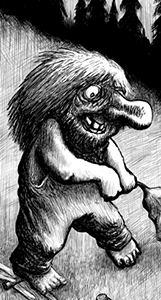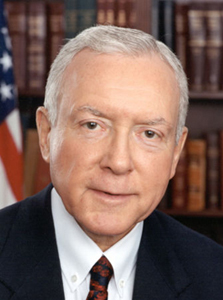 Just in time for Halloween, Senator Orrin Hatch (R-Utah) has introduced yet another piece of legislation to combat the perceived "patent troll" problem. The Patent Litigation Integrity Act (S. 1612) is aimed at shifting the reasonable fees and other expenses from the prevailing party in patent litigations to the non-prevailing party, absent "substantially justified" conduct, or other circumstances that would make it unjust. The proposed changes to 35 U.S.C. § 285 (Fees and other expenses) are nearly identical to the comparable section of the Goodlatte "Innovation Act," currently being discussed by the House. The only significant difference between the two amendments to § 285 is that the Senate bill specifies that "reasonable fees and expenses" includes attorney fees. As a result, both the House and Senate now currently have bills pending that would make the shifting of fees in patent litigation the default which can only be overcome by showing that conduct was substantially justified. However, neither version provides guidance explaining when such "justifications" rises to the level of "substantial."
Just in time for Halloween, Senator Orrin Hatch (R-Utah) has introduced yet another piece of legislation to combat the perceived "patent troll" problem. The Patent Litigation Integrity Act (S. 1612) is aimed at shifting the reasonable fees and other expenses from the prevailing party in patent litigations to the non-prevailing party, absent "substantially justified" conduct, or other circumstances that would make it unjust. The proposed changes to 35 U.S.C. § 285 (Fees and other expenses) are nearly identical to the comparable section of the Goodlatte "Innovation Act," currently being discussed by the House. The only significant difference between the two amendments to § 285 is that the Senate bill specifies that "reasonable fees and expenses" includes attorney fees. As a result, both the House and Senate now currently have bills pending that would make the shifting of fees in patent litigation the default which can only be overcome by showing that conduct was substantially justified. However, neither version provides guidance explaining when such "justifications" rises to the level of "substantial."
Where the House and Senate bills diverge is in on how to hold the parties accountable for such fees, especially the plaintiff patent holders. Rep. Goodlatte's bill proposes making the fees "recoverable against any interested party joined pursuant to section 299(d)." That section would allow joinder of an interested party if "the party alleging infringement has no substantial interest in the patent or patents at issue other than asserting such patent claim in litigation." Therefore, not only must an "interested party" be identified, it must be shown that the patent-asserting plaintiff has no other interest in the patent (other than in asserting the patent). Sen. Hatch's bill takes a different tact, providing for the potential discretionary bonding by "the party alleging infringement." In this provision, the court is given the express authority to order such a party to "post a bond sufficient to ensure payment of the accused infringer's reasonable fees and other expenses, including attorney fees." The provision goes on to highlight factors that the court "shall consider" in determining whether such "a bond requirement would be unreasonable or unnecessary." These include: (1) whether the bond will burden the party alleging infringement to pursue unrelated activities; (2) whether the party is an institution of higher learning or non-profit technology transfer organization; (3) whether the party is a licensee of such an institution or organization and conducts further development on the subject matter; (4) whether the party is a named inventor or original assignee; (5) whether the party practices the invention; (6) whether the party can prove they have the ability to pay; and/or (7) whether the party will agree to pay the shifted fees (and has the ability to do so).
 Two immediate observations come to mind. First, the bill introduced by Sen. Hatch (at left) treats the parties equally when it comes to fee shifting, but it only provides for the bonding by the party asserting patent infringement. It is clear that the goal of this provision is to stop the "trolls," but it is also possible to imagine an alleged infringer dragging out litigation in the face of evident willful infringement in the hopes of deterring the patent holder with increased costs. On the other hand, the patent holder would have the ability to request a preliminary injunction in such a case, especially if the alleged infringer's case is so obviously without merit. The second observation is that this could set up for a patent enforcement system that has two classes of patent-asserting plaintiffs -- those for whom there is no upfront cost to assert infringement, and those for whom there is an "entry fee," which could run in the millions of dollars. The point has been made many times that there is an economic justification for non-practicing patent asserting entities -- for example, they can help innovators that do not have sufficient resources of their own to capitalize on their inventions and they can help provide liquidity to the intellectual property market. If such a "bond" provision is enacted, it could have a chilling effect on the legitimate patent asserting entities, which could have the unintended consequence of hindering innovation. Perhaps in anticipation of such criticism, Sen. Hatch explained in a press release that "[f]ee shifting without the option to seek a bond is like writing a check on an empty account, and that's why it is important to include both in any legislation dealing with patent trolls."
Two immediate observations come to mind. First, the bill introduced by Sen. Hatch (at left) treats the parties equally when it comes to fee shifting, but it only provides for the bonding by the party asserting patent infringement. It is clear that the goal of this provision is to stop the "trolls," but it is also possible to imagine an alleged infringer dragging out litigation in the face of evident willful infringement in the hopes of deterring the patent holder with increased costs. On the other hand, the patent holder would have the ability to request a preliminary injunction in such a case, especially if the alleged infringer's case is so obviously without merit. The second observation is that this could set up for a patent enforcement system that has two classes of patent-asserting plaintiffs -- those for whom there is no upfront cost to assert infringement, and those for whom there is an "entry fee," which could run in the millions of dollars. The point has been made many times that there is an economic justification for non-practicing patent asserting entities -- for example, they can help innovators that do not have sufficient resources of their own to capitalize on their inventions and they can help provide liquidity to the intellectual property market. If such a "bond" provision is enacted, it could have a chilling effect on the legitimate patent asserting entities, which could have the unintended consequence of hindering innovation. Perhaps in anticipation of such criticism, Sen. Hatch explained in a press release that "[f]ee shifting without the option to seek a bond is like writing a check on an empty account, and that's why it is important to include both in any legislation dealing with patent trolls."
The introduction of this bill also brings up two important questions. First, is there a problem with the current fee-shifting section of § 285? According to most commentators, there does appear to be. According to the June 4, 2013 New York Times Op-Ed piece, Chief Judge Rader, Colleen Chien, and David Hricik pointed out that of the nearly 3,000 patent cases filed in 2011, only about 20 had fees shifted under § 285 (see "When NPR Podcasters Hit the Patent System"). That piece complained that federal judges were not using fee-shifting provision with sufficient regularity to discourage "troll"-like behavior. However, part of the problem could lie in the standards established by the Federal Circuit to establish that a case in exceptional. Along those lines, earlier this month, the Supreme Court granted certiorari in two cases dealing with the fee-shifting provision of § 285. In the first, Octane Fitness v. Icon Health and Fitness, the Court framed the issue as:
[W]hether the Federal Circuit's promulgation of a rigid and exclusive two-part test for determining whether a case is 'exceptional' under 35 U.S.C. § 285 improperly appropriates a district court's discretionary authority to award attorney fees to prevailing accused infringers in contravention of statutory intent and this Court's precedent, thereby raising the standard for accused infringers (but not patentees) to recoup fees and encouraging patent plaintiffs to bring spurious patent cases to cause competitive harm or coerce unwarranted settlement from defendants.
The framing of the question makes it appear that the Supreme Court is aware of the perceived patent-troll problem, and perhaps is even aware of Chief Judge Radar's opinion regarding the need to use § 285 more frequently. In the second case, Highmark Inc. v. Allcare Management Sys., Inc., the Court framed the issue as:
Whether a district court's exceptional-case finding under 35 U.S.C. § 285 (which permits the court to award attorney's fees in exceptional cases), based on its judgment that a suit is objectively baseless, is entitled to deference.
The Federal Circuit has been reviewing such cases de novo, and it is perceived that this creates yet another hurdle for the accused infringer to recoup their fees in such cases. In addition to these upcoming Supreme Court cases and the proposed legislation, President Obama last June recommended a series of legislative measures to curb the perceived troll problem, including permitting "more discretion in awarding fees to prevailing parties in patent cases . . . (similar to the legal standard that applies in copyright infringement cases)." Therefore, all three branches of government appear to believe that some change needs to be made to § 285, at least as it is currently applied.
The second question is whether this is the right time to make such a change. Rep. Conyers suggested yesterday in the hearing of the House Committee on the Judiciary that this might not be the best time to amend the fee-shifting statute, suggesting that it would be prudent to wait and see what the Supreme Court says on the issue (see "House Judiciary Committee Holds Hearing on Innovation Act"). Moreover, Rep. Goodlatte's bill includes provisions for heightened pleading standards. It is unclear what sort of traction such a provision will have, but it appears that there is support for making a change beyond the notice pleading that exists currently. However, if such a provision were enacted, then requiring a patent holder to both plead with very specific particularity and post a bond would seem overkill and would most certainly swing the pendulum far in the other direction. It would therefore seem to make sense to postpone amending the fee-shifting statute, or at least hold off on proposing particular changes at least until the pleadings-standard changes are solidified.
Patent Docs will continue to monitor and report on the activity of both the Goodlatte and Hatch bills, as well as any other bill introduced to curb abusive patent litigation. In the meantime, be on the look-out tomorrow for any youngster in your neighborhood masquerading as patent trolls, because they might try to shake you down for licensing fees, or at the very least, some candy.
Graphic of troll (above) by JNL was modified (cropped) from a graphic available at the Wikipedia Commons, pursuant to the Free Art License. Any use of the modified graphic is subject to the same license.